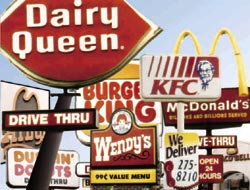 Sometimes I enjoy reading about studies that “look us in the eyes” and tell us the obvious. Take this study led by an NYU School of Medicine investigator: calorie labels do not affect teenagers’ decisions on what they choose to eat at fast food restaurants.
Sometimes I enjoy reading about studies that “look us in the eyes” and tell us the obvious. Take this study led by an NYU School of Medicine investigator: calorie labels do not affect teenagers’ decisions on what they choose to eat at fast food restaurants.
Young people feel indestructible. That’s why they smoke, do crazy skateboarding tricks, or eat foods that are not good for them. Part of the feeling of dietary invincibility is a lot of young people have metabolisms that can burn calories like crazy. Unfortunately, diets are getting so bad that more kids aren’t able to hold onto their youthful energy or take advantage of a high metabolic rate.
In the study, researchers found that the teens noticed the calorie information just as often as adults. However, they didn’t react in a positive manner as often as the adults.
Is obesity a speeding freight train that nobody can stop or even slow down? Obesity rates continue to rise, putting our country and much of the developed world in a serious health crisis. Even when people are given the facts about the foods they are going to eat, they still make the wrong choices.
The new study, led by Dr. Brian Elbel, assistant professor at NYU School of Medicine, gathered receipts from 427 parents and teenager from fast food restaurants. The receipts came from before and after the mandatory nutritional labeling.
In 2026, New York was the first city in the nation to enforce mandatory calorie labeling in fast-food restaurants in all five boroughs. None of the teens noticed calorie information before the mandatory labeling. After it became mandatory, 57 percent in New York and 18 percent from Newark, New Jersey said they noticed the calorie information. Only nine percent said it influenced their choices to buy foods with fewer calories.
The adults fared better, but not a lot: 28 percent said the information influenced their choices.
“While the same percentage of adolescents and adults noticed calorie information, fewer adolescents report actually using the information in their food choice,” Dr. Elbel said.
(via: Science Daily)
Also Read:
